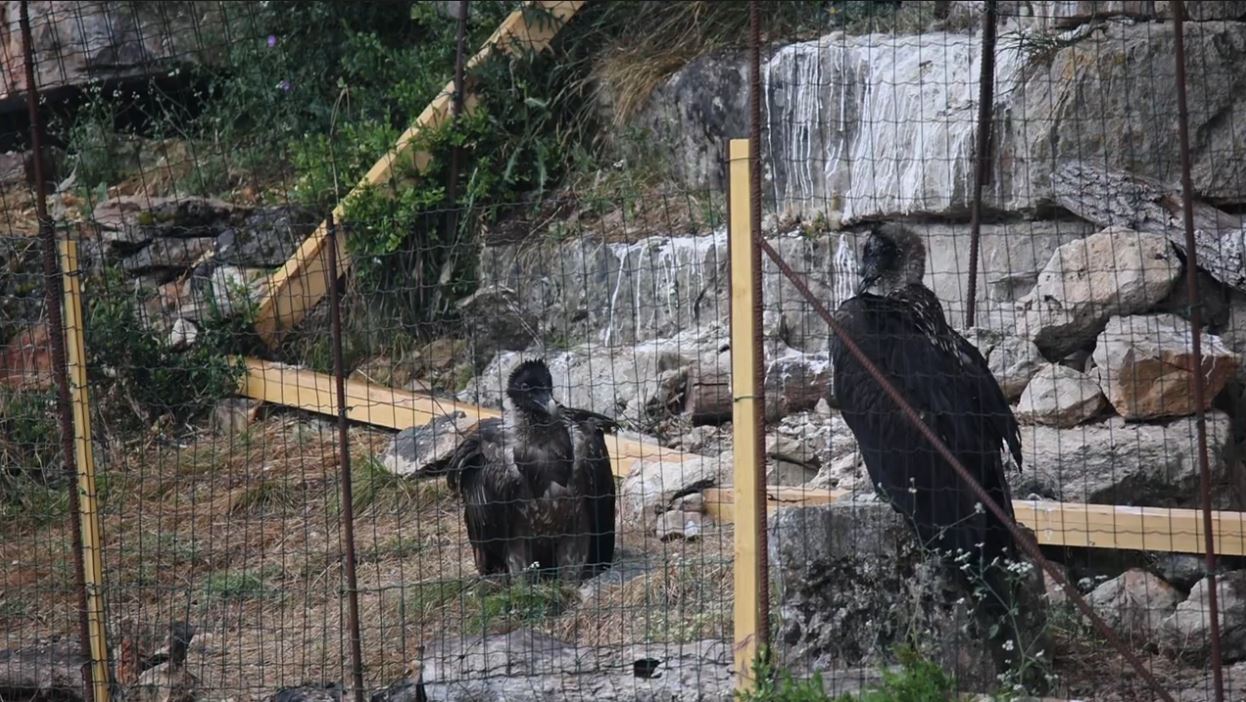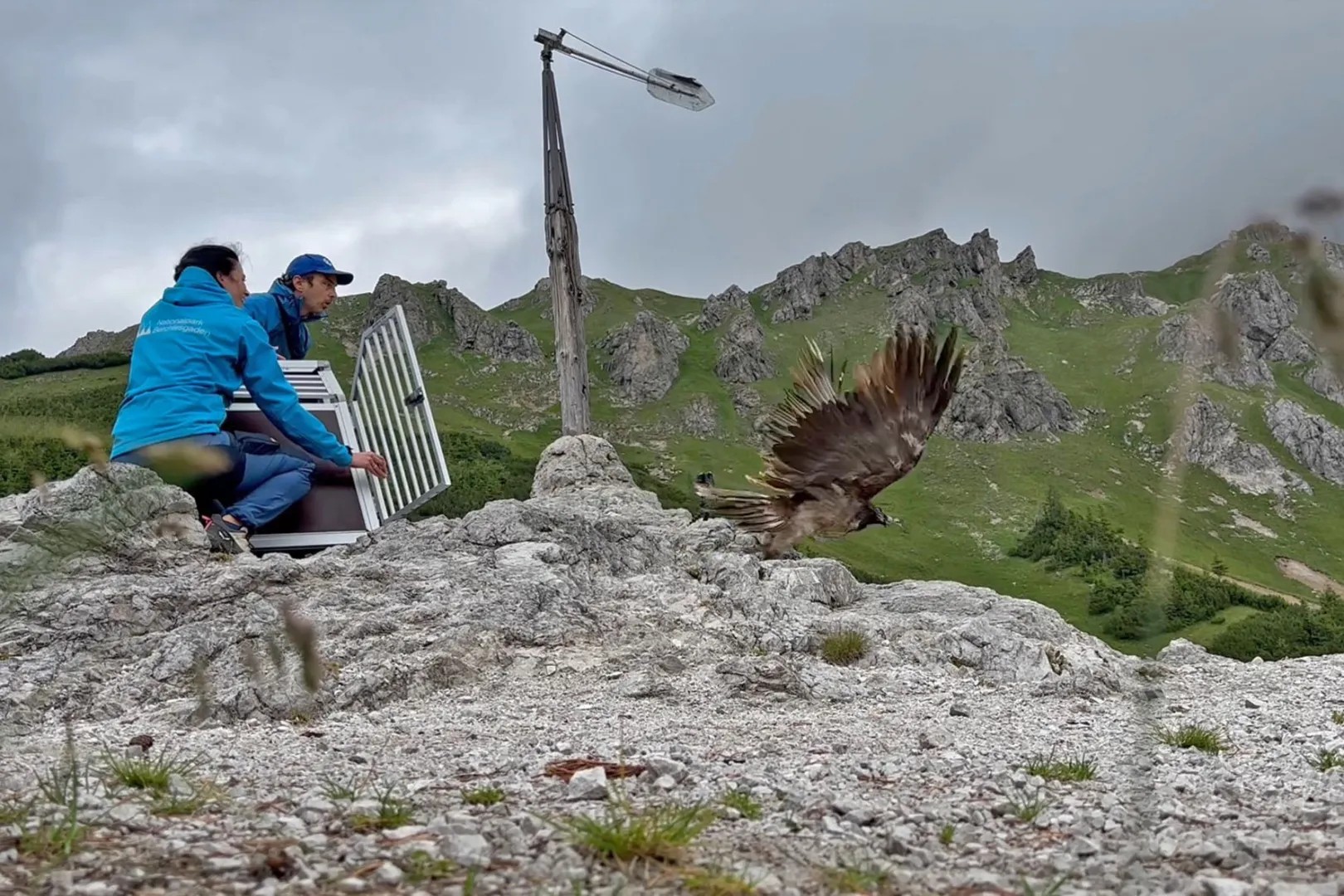On 7-8 November 2024, Parc naturel régional de Corse, hosted a crucial gathering for Bearded Vulture (Gypaetus barbatus) conservation in the scenic coastal city of Ajaccio in Corsica. Conservationists from across Europe participated to learn about the progress, challenges, and future directions of the LIFE GypRescue – a project to prevent the extinction of the Bearded Vulture in Corsica that has been running since 2021.
With more than 100 experts from various countries in attendance, the seminar provided valuable insights into the current state of Corsica’s critically endangered Bearded Vulture population and underscored the need for continued collaborative efforts to secure its survival.

A population on the rise, but far from being saved
Still on the brink of extinction, Corsica’s Bearded Vulture population has shown signs of recovery. The LIFE GypRescue project has stabilised numbers, growing from as few as two pairs to a current count of about four to six. Though still modest, this increase marks a crucial shift, suggesting that immediate extinction risks may have been averted.
Key Conservation Challenges and Solutions
Local experts shared insights on persistent threats facing Corsican Bearded Vultures:
- Limited food sources: The Corsican mouflon population, a crucial food source, remains small with only about 1,000 individuals. Additionally, the seasonal food availability, especially during winter when breeding occurs, adds challenges.
- Low breeding productivity: Corsican Bearded Vultures have low breeding success, partly due to an aging, isolated population and partly due to other factors that remain unclear. This has been improved by increasing the population through the release of individuals.
- Lead poisoning: Lead from hunting ammunition poses a serious risk to vultures. Through collaboration with hunters, the project have successfully advocated for non-lead alternatives in crucial habitats.
- Electrocution and collision risks: Collisions with power lines and electrocution remain constant hazards for the vultures. Project partner EDF has responded by insulating power lines and adding bird markers on the island, reducing these dangers significantly. Highlights from the seminar.
Highlights from the seminar
Along with the great presentations from the experts, one of the seminar’s highlights was the world premiere of a new documentary by a Corsican filmmaker Martin Van Boone. Created as part of the LIFE GypRescue initiative, the documentary captures the essence of Bearded Vulture conservation, showcasing the species’ unique beauty and the formidable challenges of protecting it within Corsica’s mountainous terrain. The film stands as a compelling visual testament to the dedication of those working to save these birds.



Another inspiring aspect of the seminar was hearing about the success of the restocking initiative and the remarkable cooperation with hunters to adopt lead-free ammunition. Efforts to improve reproductive success also include monitoring five nests with cameras, which are expected to provide valuable insights into the challenges affecting breeding.
Also one essential point of the seminar that should be mentioned is the preservation of the unique Corsican gene pool. Within the project, three eggs that would not have hatched in the wild have been successfully incubated and integrated into the breeding stock. This milestone helps retain Corsica’s genetic lineage, although efforts continue to more fully reflect the genetic diversity of the native population. Therefore we hope that additional eggs—which cannot hatch in the wild—can hatch under human care, thus preserving the Corsican gene pool as fully and sustainably as possible. The offspring of these secured birds could then be highly valuable for future restoration efforts of the Corsican population.
Moving forward with hope and collaboration
The LIFE GypRescue project might have prevented what once seemed like inevitable extinction for Corsica’s Bearded Vultures. The success of restocking and supplementary feeding, combined with efforts to address infrastructure and environmental threats, has turned the tide for this fragile population. The seminar emphasised the power of international collaboration, bringing together conservationists, local authorities, and partners to share knowledge and strategies.
As the Bearded Vultures continue their recovery, new initiatives from the project such as the documentary, will help raise awareness and support for their survival. With Corsican and European conservationists working side by side, the future of the Bearded Vulture in Corsica now holds a glimmer of hope, offering a powerful example of what collective action can achieve.
Now it’s time to continue with the International Bearded Vulture Meeting programme, so stay tuned for updates from the conference!

About the LIFE GypRescue Project
Led by Parc naturel régional de Corse, in collaboration with Ligue pour la Protection des Oiseaux, Direction des systèmes énergétiques insulaires, Fédération des Chasseurs de la Corse du Sud and us at the Vulture Conservation Foundation, the LIFE GYPRESCUE project (LIFE20 NAT/FR/001553) came to life in 2021 to prevent the extinction of the Bearded Vulture in Corsica. The project team strives to increase the population through restocking actions, improve the natural reproduction and boost the island’s nesting capacity for the species, while preventing human-related disturbance and mitigating threats to reduce mortality.




